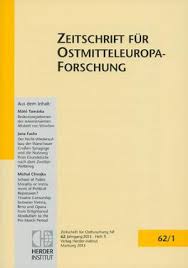Die letzte Fluchtwelle aus der DDR im Jahr 1989. Aus den Berichten der westdeutschen Botschaften in Budapest, Prag und Warschau
The Last Wave of Refugees from the GDR in 1989. From the West German Embassy Reports in Budapest, Prague and Warsaw
Author(s): Katarzyna StokłosaSubject(s): Post-War period (1950 - 1989), Migration Studies, Asylum, Refugees, Migration as Policy-fields
Published by: Verlag Herder-Institut
Keywords: Last Wave of Refugees; GDR; 1989; West German Embassy Reports; Budapest; Prague; Warsaw;
Summary/Abstract: In the summer of 1989, the flood of East Germans seeking to move to the Federal Republic of Germany took a number of westward routes, including through Czechoslovakia, Hungary and Poland. In each of these countries, GDR citizens sought refuge and help from the West German embassy, whether in Prague, Budapest or Warsaw. Primarily based on material from the political archives in the German Foreign Office, this paper seeks to analyse the mass movement of GDR citizens through the West German embassies in Budapest, Prague and Warsaw, as well as the politicians’ reactions in Hungary, the Czech Republic and Poland. The main focus is on a comparative analysis of the West German embassy reports from these three countries. The paper enquires into the motives behind the tolerance, and even acceptance, of these transit receiving societies. Starting with a description of the most important events in the West German embassies in Budapest, Prague and Warsaw shortly before the collapse of the Eastern Bloc and the beginning of the transformation phase, the paper then explores how communication regarding the GDR refugees flowed between destination countries, the West German embassies and the GDR. In turn, this enables an analysis of the system in the communist countries in the last weeks leading up to the “Wende”, the turning point in German reunification history. Comparative analysis of the GDR citizens’ escape and interim residence in West German embassies in Budapest, Prague and Warsaw, not to mention an analysis of the three countries’ reactions, clearly shows that Hungary and its West German embassy played the most important role. The dismantling of the border control posts on the Hungarian-Austrian border had an emboldening effect on potential refugees. Furthermore, the Hungarian government’s approach – when compared to that of the Polish and Czechoslovakian governments – was clearly the most open and courageous. Given that Hungary did not share a border with the GDR, the country found itself in a far more favourable position than the other two countries, which were Eastern Germany’s immediate neighbours. For precisely this reason, Budapest was most likely to succeed in any courageous action, due to the less significant need to take the GDR into consideration. The alliance with the GDR was not as essential for Hungary as was perceived to be the case by the Polish and, especially, by the Czechoslovakian ruling authorities. The interaction between representatives of the West German embassy in Budapest and the Hungarian government proved to be the most effective. Likewise in Poland, communication between representatives of the Polish government and the Federal Republic went smoothly. Because noticeably fewer refugees streamed into the West German embassy in Warsaw than was the case in Budapest, the Warsaw embassy did not have to put as much effort into the organisation of additional accommodation outside the walls of the embassy building. Of the three countries under investigation, Czechoslovakia is distinctive for its unwillingness to compromise its good relations with the GDR on account of the refugee question. There can be no denying the very real and present fear of a harsh reaction from Moscow in all three communist countries. In this respect, Czechoslovakia expressed the greatest apprehension – the trauma resulting from the 1968 intervention continued to run deep. At the same time, those countries willing to cooperate won a high level of respect and support from the Federal Republic of Germany. Without doubt, the desire to gain prestige in the eyes of Bonn was a very important motive for taking in refugees in each of these countries.
Journal: Zeitschrift für Ostmitteleuropa-Forschung
- Issue Year: 64/2015
- Issue No: 1
- Page Range: 40-80
- Page Count: 41
- Language: German

